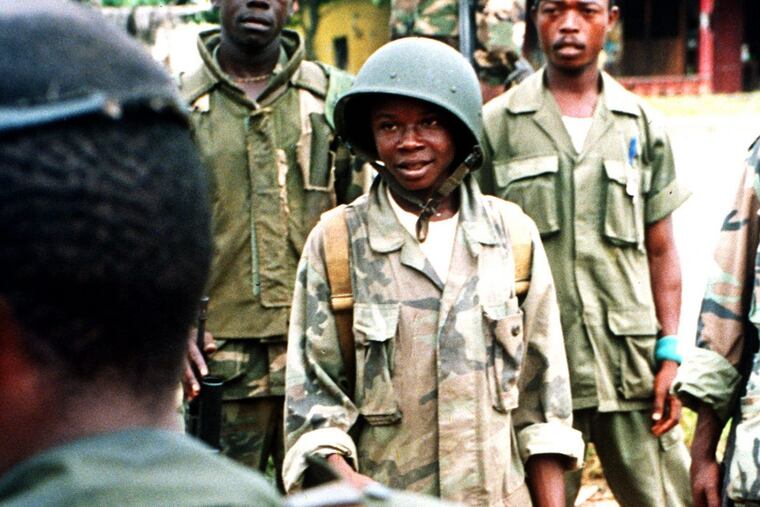Clinging to life - and a tree root - she says she evaded Liberian tormentors
Government lawyers said they expect to wrap up their case against the 51-year-old East Lansdowne man early next week.

Freezing, terrified, and 15 years old, she hid underwater, clinging to a tree root for fear that powerful river currents would wash her away.
But as the Liberian woman, now 38, recounted her flight two decades ago from rebel soldiers who had held her as a sex slave, she told a federal jury in Philadelphia on Thursday that she was certain she would be spotted.
"I could hear them," she said of the jungle fighters who hunted her through the night. "When I would shake, I thought they would see."
The Inquirer and Daily News are withholding the woman's name because she is a sexual assault victim and in deference to concerns she could face retribution in Liberia. Her testimony concluded the second week of the immigration fraud trial of Mohammed Jabateh, whom prosecutors have accused of leading her pursuers.
Over six days in a Philadelphia federal courtroom, 19 of Jabateh's former countrymen have accused him of similar acts of terror, murder, enslavement, and cannibalism carried out during the ethnically charged, multifaction civil war that ravaged Liberia between 1989 and 1996. He is charged with hiding his role as the warlord "Jungle Jabbah" during that conflict while applying for political asylum to the United States.
Prosecutors said they expect to wrap up their case against Jabateh, 51, of East Lansdowne, early next week.
Jabateh has denied any role in the atrocities described by government witnesses. Thursday was no different.
Jabateh shook his head as a 43-year-old farmer walked jurors through the mining operation that Jungle Jabbah's soldiers, allied with a faction of the United Liberation Movement of Liberia for Democracy (ULIMO-K), set up along the Lofa River in northwestern Liberia.
The farmer testified that he had been captured from Haindi, a village in central Liberia, and forced into backbreaking labor at a diamond mine under constant guard by child soldiers brandishing automatic rifles.
While he dug in the dirt for diamonds, he said, the soldiers extracted his dignity piece by piece.
"When you refuse to do work, they beat or killed you," he said. "We were slaves."
Rebels thrashed those who tried to hide the gemstones they found – and sometimes those who hadn't.
As one man – a 47-year-old prospector from northeast Liberia — testified Thursday, he saw soldiers falsely accuse a fellow enslaved miner of swallowing a diamond. They force-fed the man cassava leaves, a natural laxative, to recover it.
"No diamond came out," the man said. "They beat him all day. He was sick for a week."
But even those brutal accounts of bondage in Liberia's alluvial swamps paled next to the subjugation described by the woman whose testimony concluded Thursday's proceedings.
Days before her harrowing flight and the night she spent hiding in river water in 1994, she said, she fell into the hands of ULIMO-K soldiers while fleeing from a rival group's attack on her village.
Eight months pregnant and a teenager at the time, the woman ran from the gunfire to the riverbank, where an elderly man built a raft to help her escape, she testified.
When they arrived on the other side, Jabateh's soldiers were waiting. The fighters marched them to their base nearby, she said, and accused them of being spies.
Jabateh, the woman told the jury, ordered the man who had rescued her to be tied to a kola tree and executed.
" 'Please, I'm begging you guys,' " she recalled the rescuer saying before his death. " 'I am not a spy.' "
The woman also accused Jabateh on Thursday of giving her away like property to one of his lieutenants – a short, burly man several years her senior.
She was dragged away to the man's hut, where she was held for three days, she said. On the first day, she told jurors, the rapes began; she miscarried on the second.
When the third day came, the woman testified, she worked up the nerve to try to escape.
"The soldiers were having a party in the town, [and] they were all drunk," she said. "I came outside because I was having pains in my stomach, [but] I ran into the bush."
Her captor soon realized she was missing. She heard his shouting through the jungle.
" 'When I catch her tonight,' " she recalled him saying. " 'I'm going to kill her.' "
Soldiers fanned out into the brush in pursuit. She tore through the foliage, she said.
Eventually, there was only one place left to hide: a bend in the river with a tree root beckoning from its banks.